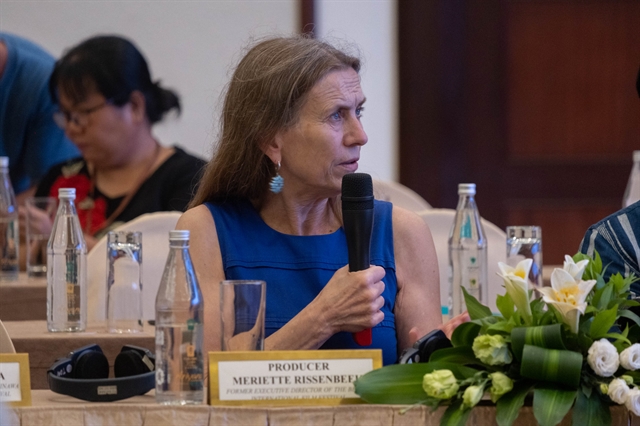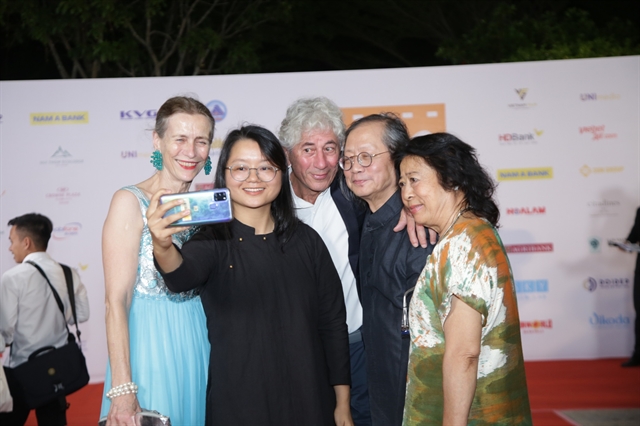.jfif) Opinion
Opinion

Mariette Rissenbeek, former executive director of the Berlin International Film Festival (Berlinale) from 2019 to 2024, is a prominent figure in the global film industry. Before her role at Berlinale, she served as the managing director of German Films, an organisation dedicated to the international promotion of German cinema. This year, Rissenbeek joined the Đà Nẵng Asian Film Festival as a member of the jury for the Asian film competition.
In an interview with Việt Nam News reporter Trần Khánh An, she shares her thoughts on Asian and Vietnamese cinema, nurturing young talent, and the potential for international film festivals in Việt Nam.
 |
| Mariette Rissenbeek was the former executive director of the Berlin International Film Festival (Berlinale) from 2019 to 2024, one of the largest public film festivals in the world. Photo courtesy of DANAFF |
Inner Sanctum: What do you think about the increasing attention to Asian cinema? What is the most distinctive feature of Asian and Vietnamese cinema?
It's a bit unfortunate that the film industry in Europe and the US has historically dominated the scene, causing us to miss out on films from other regions, including Asia and Africa. If you love cinema, you're always eager to see something new. The growth of Asian cinema offers a great opportunity for Europe and the US to experience inspiring films with fresh perspectives from other countries.
For me, Asian cinema is very poetic, with a distinct and strong aesthetic. In Germany, many young filmmakers focus solely on storytelling, sometimes in a rather straightforward or pragmatic way. In Asia, the method of storytelling is crucial, delivered in a strong and aesthetically pleasing manner. Similarly, I find Vietnamese cinema to be both aesthetic and poetic, which I believe are its strongest elements.
Inner Sanctum: Which young Vietnamese filmmaker has impressed you the most?
I'm not great with remembering names, but there is a film titled Culi Never Cries by a young Vietnamese director [Phạm Ngọc Lân], which was featured at Berlinale. It showcased the strong artistic value of Vietnamese cinema. I haven't yet seen the films of my fellow juror, Hà Lệ Diễm, so I'm eager to explore her work. She's from the northern region of Việt Nam and mentioned that the northern midlands and mountainous areas are distinct from other regions, which piques my curiosity.
Việt Nam has many talented filmmakers who aren't afraid to tell challenging stories. I sense that the artistic voices in Vietnamese cinema are strong and deeply connected to society and the current happenings in the country. Watching films by young Vietnamese filmmakers always teaches me something new about the country, its people, and the issues that concern them.
Inner Sanctum: Having joined the Đà Nẵng Asian Film Festival this year, how do you evaluate Việt Nam's potential to develop international film festivals?
I’m impressed by the organisation of the Đà Nẵng Asian Film Festival, especially considering it's only the second edition. The audiences in Đà Nẵng seem genuinely interested in cinema, which is a great sign. I believe it is possible to attract international audiences to film festivals in Việt Nam, as well as engage Vietnamese audiences. I hope that film festivals here will continue to develop as they have so far.
 |
| Mariette Rissenbeek (1st left) selfies with other juries of the Asian film competition at the 2024 Đà Nẵng Asian Film Festival in Việt Nam. Photo courtesy of DANAFF |
Inner Sanctum: How did Berlinale encourage and nurture young filmmakers?
At Berlinale, we have a section called Generation that is dedicated to young audiences. The city government is keen on educating young people to appreciate culture and films, so we collaborate with schools and teachers to bring students to the festival, giving them a chance to discover films from all over the world on various topics. This is an educational effort aimed at the younger generations.
At the same time, we bring the world to Berlin. This aspect makes Berlinale unique. The festival's audience is very diverse, so we created various sections with different types of films from various countries and on different subjects. Many people in Germany, even those not working in the film industry, take a week off to attend Berlinale because they know that each programme is carefully curated for them. The people responsible for the festival have a strong artistic responsibility and sufficient resources to do their job well.
Additionally, we have a section called Berlinale Talents, which is designed to encourage creativity and motivation among young filmmakers. We invite about 200 filmmakers from around the world to attend workshops, masterclasses, and diverse programmes during the festival. We maintain this network over the years so they can build a community of young filmmakers, including directors, producers, and cinematographers – all of whom play different roles in the film industry.
Berlin is recognised as a cinema city, where films are produced, partly due to the prominence of Berlinale. This is an aspect I hope can be developed in Đà Nẵng as well. Establishing a film industry in Đà Nẵng could be an important part of the city's future, and it warrants more discussion.
Inner Sanctum: You have nearly twenty years of experience working in German Films. From your perspective, what can Việt Nam do to foster its film industry and amplify its films on the global stage?
It's crucial for Vietnamese filmmakers, even if they don't have a film yet, to have opportunities to participate in international film festivals in Busan, Cannes, or Berlin. This allows young filmmakers to build global networks and gain insights into how the cinema industry operates in other countries. It also helps them understand how to effectively use film festivals to promote their work.
Of course, if a Vietnamese film is showcased at Cannes or Berlinale, it raises awareness of Việt Nam's vibrant film industry, its networks, and expertise. Making Vietnamese cinema more visible is key – it's all about reaching out and letting people know there are many diverse voices in Việt Nam.
Reflecting on what we did at German Films, we organised German Film Week in various countries. I believe the Vietnamese government could fund similar initiatives, such as Vietnamese Film Week in Berlin, Paris, or other major cities, to increase the visibility of Vietnamese filmmaking on the international stage. VNS




